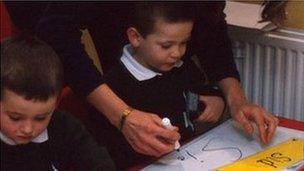Classroom assistants used as teachers, claims union
- Published

Classroom support staff say they are standing in for qualified teachers, says the ATL
Classroom support staff say they are increasingly being asked to stand in for fully qualified teachers, a union is claiming.
A third (32%) of support staff in UK state schools polled by the Association of Teachers and Lecturers (ATL) said they took classes for absent teachers.
Over a fifth (22%) said they took more classes in 2012-13 than in 2011-12.
A Department for Education (DfE) spokeswoman said: "The rules are clear - they should not be teaching."
The DfE said teaching assistants and other classroom support staff played a vital role in the classroom, short of teaching whole classes of children.
Staff expertise
"The government's recent review of school efficiency showed that, when properly trained and deployed, teaching assistants play an important role in helping to improve learning," the spokeswoman said.
"It is for school leaders to use the expertise of all staff to ensure any disruption to pupils is minimal and that taxpayers get value for money."
The ATL polled more than 1,400 of its members working as support staff in state schools in England, Wales and Northern Ireland.
A spokeswoman for the union said the rules allow classroom assistants to teach small groups of children under the supervision of a qualified teacher, but they should not teach whole classes or prepare teaching material.
Higher level teaching assistants may contribute to lesson planning and deliver lessons to whole classes to assist an assigned teacher, while cover supervisors are employed to supervise classes while pupils complete work set by a teacher.
A quarter (25.4%) of the teaching assistants and learning support workers surveyed and almost half (49.1%) of higher level teaching assistants said they were asked to cover lessons.
Of the 400 who said they stood in for the regular class teacher, 60% said they did the same work as fully qualified teachers, claims the union, while a third (31%) of these staff said they had been used to take classes for three or more consecutive days.
The union quotes a higher level teaching assistant at a secondary school in England: "I prepare, teach and mark at least four lessons for two year-7, bottom-set classes, and a year-8 set for at least three hours a week. It is teaching on the cheap."
'Cheap option'
A cover supervisor said: "I have even been asked to give copies of lessons I have prepared to members of teaching staff."
A primary school teaching assistant added: "It is unfair that many teaching assistants are teaching classes in the absence of a teacher, and doing the same job as a teacher for much less money."
ATL general secretary Dr Mary Bousted said: "Schools are selling children short by using teaching assistants to teach classes when the regular teacher is unavailable.
"We are totally opposed to this exploitation of support staff who are being used as a cheap option to teachers.
"It is grossly unfair on them and on the children and their parents who rightly expect their children to be taught by qualified teachers."
- Published24 July 2013
- Published2 July 2013
- Published3 April 2013
- Published31 March 2013